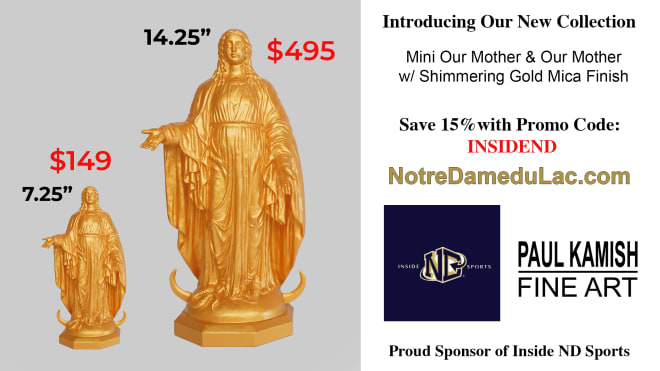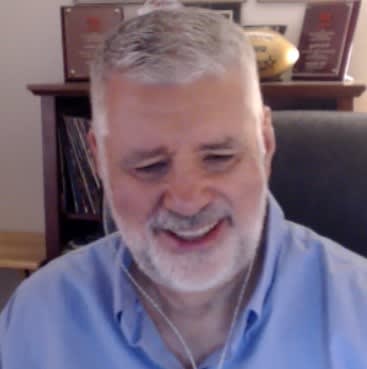Editor’s note: This is the third and final story in a multi-part series profiling new Notre Dame athletic director Pete Bevacqua, who officially succeeded Jack Swarbrick on March 25.
Part I: New AD Pete Bevacqua shares his vision for Notre Dame's next national title
Part II: Digging into the front-burner issues that greet Notre Dame AD Pete Bevacqua

SOUTH BEND, Ind. — On a day when new Notre Dame athletic director Pete Bevacqua is, per usual, being pulled in more directions than he can comfortably honor, he has prioritized a meeting with one of the school’s student-athletes in the morning, and another right after lunch.
This was logistically easier and more commonplace during his eight months of Jack Swarbrick’s take-your-successor-to-work days for Bevacqua that culminated in the actual handing off of the keys to the athletic department on March 25.
But every bit as important.
Related Content
► Notebook: Notre Dame's wide receivers work to earn spots in rotation
► Notebook: Mike Denbrock instills aggressive mindset in Notre Dame's offense
► Notebook: Al Golden keeps sense of urgency in evolving Notre Dame's defense
► WBB: Notre Dame guard Hannah Hidalgo wins Dawn Staley Award
► Notre Dame football depth chart projection after spring practice No. 6
---------------------------------------------------------------
“I would say that student-athlete experience, maintaining it is my No. 1 priority walking in the door,” Bevacqua told Inside ND Sports this past week in a one-on-one interview. “I think it’s one of the great differentiators for Notre Dame. I think it’s one of our greatest strengths — when you come here as a student-athlete, you’re going to have a full Notre Dame experience. You’re going to be fully integrated into this campus community.”
Even as the definition of student-athlete broadly, nationally is changing seismically and seemingly at light speed in so many other ways, including on the ND campus.
With the NCAA’s structural and enforcement power structures seemingly irredeemably broken, Congress perpetually distracted when tugged on to help, and the courts and labor organizations continuing to change the balance of power.
And yet Bevacqua sees his role as Notre Dame’s athletic director as providing a voice, and guardrails and answers about where all of this is headed, just as Swarbrick did — sometimes well under the radar of the average fan — during his 17-year run as Notre Dame’s AD.
“I haven’t been shy about saying, ‘It wasn’t as though I was waking up every morning dreaming of being an athletic director.’” the 52-year-old Notre Dame grad and former chair and president of NBC Sports said. “There’s only one place I would ever do it. Without a doubt.
“As I said in an interview I did last week, the chaos kind of excites me. It’s not the old days of being an athletic director. It’s chaos. Notre Dame has a seat at that table, and we have an important voice.
“And we have to preserve everything that makes Notre Dame special and, quite frankly, that makes college sports special. And so, I’ve been a part of the major sports landscape now for 20-plus years in a lot of different ways.
“Whether that was as a lawyer back at the USGA or running major events like the U.S. Open, some agency experience at CAA, running the PGA of America, obviously on the media side, which is so important in college sports, the chairman of NBC Sports, I’d like to think — I hope — that each of those roles in a different way have kind of prepared me to come into this role with a head of steam.”
That’s not just in the evolving definition of student-athlete. It’s in the high-stakes game of media rights. It’s keeping Notre Dame’s access to a national championship in football unimpeded. It’s keeping the school from becoming one of the ever-increasing athletic programs being sent to college sports’ version of the kids’ table at Thanksgiving.
“I think it’s one of the key responsibilities of this position,” Bevacqua said. “And full credit, Jack did a wonderful job with that. And that shows the relevance and the value and the unique power of Notre Dame.
“To maintain that independence in football, to be a key part of the ACC in all of our other sports with the exception of hockey. But to have that voice in intercollegiate sports — whether you’re interacting with the NCAA or colleagues at the ACC or have a seat at that very important table at the CFP, to have that voice in Washington when you’re talking to Congress about NIL and the importance of the student-athlete experience.
“If I look back over the course of the eight months — and Jack and I have such a great partnership and such a great friendship and he’s impressed me in so many ways — I’d say where he’s impressed me the most is in his dealing with Washington.
“He has such respect there when you’re talking to people as politically diverse as [U.S. senators] Ted Cruz and Cory Booker. The level of conversation he’s had with them. As I’ve said to everyone who will listen, I think Jack can be such an unbelievable force for us — not just for Notre Dame — but for college sports to continue with a very visible role in Washington talking about the importance of the student-athlete experience. Talking about changes that need to be made to keep college athletics in a healthy position.”
But are those conversations enough to keep the dynamics of college locker rooms more about the camaraderie and team-first mentality over transactional economics? And are they enough to keep the conversations with Notre Dame student-athletes Bevacqua has already come to cherish consisting of recognizable subject matter?
“Without sounding naive or Pollyanna," Bevacqua said, "I believe in my heart that most of the people that are involved in college sports, most of the people that are going to be involved in making decisions that impact college sports — whether that’s the NCAA or Congress, conferences, conference commissioners, university presidents — understand that there’s something really important about being a student-athlete. And we have to maintain that term.
“Yeah, there are athletes in all different ways, in all different levels, but there’s a huge difference between professional sports and college sports. And we have to do everything we can to make sure we don’t lose that distinction. And that doesn’t mean that student-athletes shouldn’t be fairly and properly compensated. They absolutely should.
“But we have to maintain that student-athlete experience. You come to a university to play sports — great. Not many people can do that at a major collegiate level. But you also come here for an education. And we have to fight that fight, because it means something. It’s important.
“The vast majority of student-athletes across the country, including the vast majority of student-athletes at Notre Dame, don’t all go on to be superstars. They don’t all go on to be Skylar Diggins or Kyle Hamilton.
“Life gets in the way for a host of reasons. And some of my most rewarding conversations are with former student-athletes who have come back and sat in this office who dreamt of being a professional athlete, and — for whatever reason, a host of reasons — it didn’t work out.
“But they’re prepared, because they got a Notre Dame degree and a Notre Dame education. And whether your sports dream ends at 16, 18, 22, 35, 45, it ends at some point, and the benefits of a Notre Dame education, the benefits of a college education anywhere, if it’s done properly, that’s the key. And I think everybody knows that and wants to preserve that to some degree.”
In his eight months as ND special assistant to the president on sports leading up to his full-fledged takeover at the top of the athletic department, Bevacqua’s biggest surprise was how the perception of an adversarial relationship between athletics and academics on campus was, at the very least, grossly overstated, in his experience.
That means the academic side leaning into an open mind when it comes to requests and conversations from the athletic side. And it means coaches, like third-year Irish football head coach Marcus Freeman, coining and leaning into the “choose hard” mantra instead of camouflaging that part of the Notre Dame experience in the recruiting process.
“It just gives great credence and authenticity,” Bevacqua said, “to the conversations that I’ve already had with recruits that, ‘Hey, if you’re going to come here, you’ve got to come here with eyes wide open, because you’re going to be a student-athlete, because we’re going to not just say that. We mean that.’
“And we’re going to give you every resource and every ability and means possible to succeed athletically, but we’re going to do the same thing on the academic side. It’s a 1-2 punch here at Notre Dame, and you’ve got to know that. Because if you’re going to enjoy your time here and benefit from your time here, you’re going to be a student-athlete.
“The main goal of Notre Dame is that we are going to absolutely do everything we can to maintain the student-athlete experience on our campus and simultaneously compete at the highest level and compete to win national championships. And we firmly believe we can do both.”

---------------------------------------------------------------
• Talk with Notre Dame fans on The Insider Lounge.
• Subscribe to the Inside ND Sports podcast on Apple Podcasts, Spotify, Google Podcasts, SoundCloud, Podbean or Pocket Casts.
• Subscribe to the Inside ND Sports channel on YouTube.
• Follow us on Twitter: @insideNDsports, @EHansenND, @TJamesND and @cbowles01.
• Like us on Facebook: Inside ND Sports
• Follow us on Instagram: @insideNDsports
